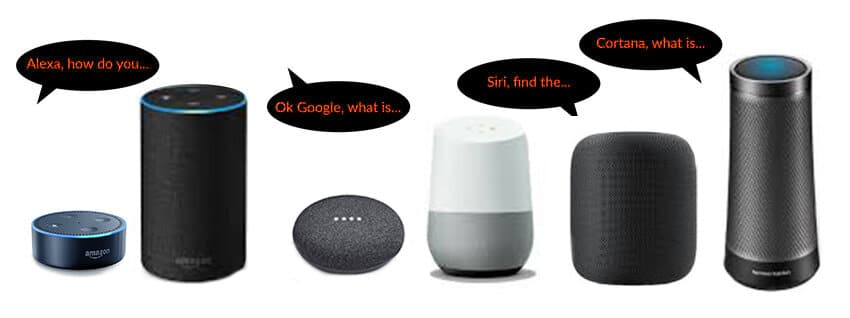
The Impact of Voice Search
You may not realize it but voice search is already impacting how your customers and potential customers interact with your business or organization.
“Voice search, also called voice-enabled, allows the user to use a voice command to search the Internet, a website, or an app. Voice search is often interactive, involving several rounds of interaction that allows a system to ask for clarification.” according to Wikipedia.
For example, if you’ve asked Amazon’s Alexa, Apple’s Siri, Google’s Voice Search, etc. a question, you have performed a voice search. And the growth of voice search is undeniable:
- 50% of all searches will be voice searches by 2020 (comScore)
- Roughly 30% of all searches will be done without a screen by 2020, per Gartner.
- 35.8% of millennials use voice-enabled digital assistants at least once a month (eMarketer) compared to just 10.1% of baby boomers.
- The number of millennials who use voice-enabled digital assistants will climb to 39.3% in 2019 (eMarketer)
- One-in-six Americans (16%) own a voice activated smart-speaker (Edison Research and NPR)
As a business located in or around Madison, what do I need to know about the voice search trend for 2019?
First, realize that voice search impacts LOCAL search.
- Internet Trends Report found that in 2016, 22% of people use voice to search for finding local information like business hours, restaurants nearby your location, or even just “things to do near me.”
- Know that voice queries contain conversational words and are generally longer than traditional searches. For example, when we use traditional computers for search, we use short phrases to find information because it requires less typing.
- On mobile, searches are more conversational, as if the user is speaking with a personal assistant. For example, if a user searches for restaurants via typing, they might enter “top restaurants in Madison.” This is the language of computers. If the same user is voice searching, they might ask a question, like “what top restaurants near me are open now?” followed up with “can I make a reservation at …”. INSIGHT: We can now understand how being in the top 3 results for each phrase (“Top restaurants”, “near me”, and “open now”) provides return on each of those investments.)

How can we optimize for voice search to gain a competitive advantage in 2019?
Voice searches are more likely to contain question phrases. Start by thinking about how your audience, customers, and sales leads speak about and discuss your business brand, products, and services.
One tool to try is Answer the Public. On this website when you enter a keyword, it returns common questions and phrases related to that keyword. For example, if your business provides security services to other businesses and organizations, you might start with the search phrase “business security”. The “questions” returned for my search are below:
- What is business security?
- What is a business security plan?
- What is a business security policy?
- How much are business security systems?
- What is the best business security system?
What can we do with this information?
- Include voice driven questions on your Frequently Asked Questions “FAQ”. Example, add “Does my business need a security plan?” to your FAQ.
- Use these human language type questions as the basis of new content across social channels including a Google My Business (GMB) post. Example, “Is your business’s security plan up-to-date? ...”
- If feedback like post views and clicks indicate that the question resonates with your audience, use the question as the basis of a gated white paper and as the basis for a specific campaign with public relations, in your newsletter, on social media, etc. Example: “Download our guide to business security planning today”.
Is there anything else I can do?
- For those searches with obvious local intent or those with “near me” in them, accurate citation listings can make a big difference. Make sure your location(s) name, address, and phone number (NAP) for on your industry's most important citation sources (such as Google My Business, Bing Places, Facebook, YouTube Channel, Yelp, etc.) are accurate.
- Audit the mobile-friendliness of your website. I’m often struck how being mobile-friendly in the same as being more SEO friendly which means being more generally accessible. Google provides a free tool named Google Search Console that will identify any mobile issues from Google’s perspective, which sadly is the only one that really matters.
For hyper-competitive local businesses:
- Use structured data for your posts, events, etc. to help search indexes like Google, better understand your published content and optimize result sets.
- Add posts with news about your neighborhood and businesses close to your location. This helps reinforce your location to those ever changing search ranking algorithms.
- This last one is simple but seems universally hard to find the time to implement. Create blog posts which answer your customers’ common questions.
Be sure that you check out our September newsletter for voice search follow up, plus a new article on how modern public relation campaigns impact search engine placement and audience sentiment.
Does your business need assistance with improving its online presence? Let's connect and set up your free initial consultation to get started.

Craig Hadley
The Creative Company
Senior Web Developer